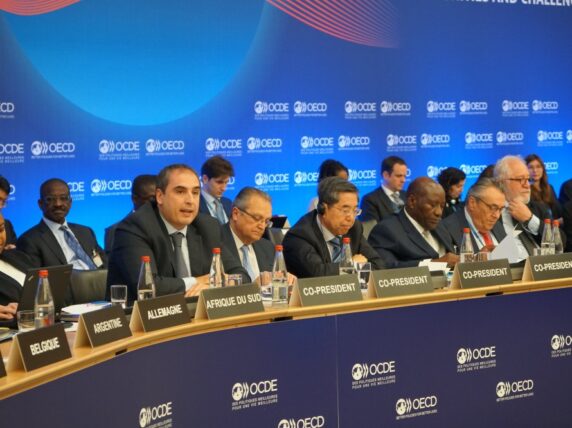Widespread criticism of the government’s plan to merge DFID with FCO
UK prime minister Boris Johnson announced on Tuesday that the Department for International Development (DFID) will be merged with the Foreign and Commonwealth Office (FCO).
Although a merger had been hinted at before by the government, the announcement came as a surprise to the development and humanitarian community.
The decision was met with derision, dismay and anger across the sector and political spectrum. Although the move has its supporters many politicians from all parties saw the move as regressive.
Here is our round up of the most prominent reactions and five observations following the announcement of the merger.
Former prime ministers call out decision
In a rare critical intervention, former prime minister and Conservative Party leader David Cameron called the move “a mistake”. Former prime ministers Tony Blair and Gordon Brown also voiced their opposition.
The Prime Minister is right to maintain the commitment to 0.7 – it saves lives, promotes a safer world and builds British influence. But the decision to merge the departments is a mistake. 1/2
— David Cameron (@David_Cameron) June 16, 2020
.@DFID_UK has lifted millions of people out of poverty, saved millions of lives, and helped millions more children go to school. It’s sad the government is abolishing one of the UK’s great international assets ~ GB https://t.co/rVXnhuKjc1
— Gordon & Sarah Brown (@OfficeGSBrown) June 16, 2020
Tony Blair: “I am utterly dismayed by the decision to abolish DFID. We created DFID in 1997 to play a strong, important role in projecting British soft power. It has done so to general global acclaim. (1/3)
— Tony Blair Institute (@InstituteGC) June 16, 2020
No cross-party consensus
The leaders of Labour, Liberal Democrats, Scottish National Party and Greens denounced the decision, with Labour leader Kier Starmer arguing that DFID’s record spoke for itself.
Abolishing one of our best performing and most important departments diminishes Britain’s place in the world.
This is a poor attempt at distraction from Boris Johnson. pic.twitter.com/etYn4a4nZw
— Keir Starmer (@Keir_Starmer) June 16, 2020
Subscribe to our newsletter
Our weekly email newsletter, Network News, is an indispensable weekly digest of the latest updates on funding, jobs, resources, news and learning opportunities in the international development sector.
Get Network News.@BorisJohnson and his cohorts are using the cover of this terrible pandemic to rip apart the UK’s structures for international development and humanitarian aid. If this is their vision for a global Britain it won’t be in the @theSNP name.
:speaking_head_in_silhouette::I had some questions for the PM pic.twitter.com/UFqbj4u20t
— Ian Blackford (@Ianblackford_MP) June 16, 2020
Later today I will ask the PM why he is so intent on taking support away from some of the most vulnerable people in the world.
He talks of “Global Britain” but his selfish, inward-looking vision for Britain weakens our country everyday he is in office. https://t.co/ctPFeiKuXU
— Ed Davey MP :large_orange_diamond::flag-eu: #StayHomeSaveLives #ProtectNHS (@EdwardJDavey) June 16, 2020
Several prominent MPs and politicians also voiced their opposition to the merger, including Conservative MP and former international development secretary Andrew Mitchell.
Abolishing Dfid in the middle of a pandemic is an extraordinary mistake, writes former cabinet minister Andrew Mitchell https://t.co/BjZKzhr1in pic.twitter.com/BJxurw8BIM
— Red Box (@timesredbox) June 17, 2020
Other politicians voicing their opposition include shadow secretary of state for development Preet Gill, chair of the international development select committee Sarah Champion and mayor of London Sadiq Khan. The decision was also criticised by two former Conservative ministers, Alistair Burt and the former secretary of state and Conservative leadership contender, Rory Stewart.
Some more detailed thoughts on why the government’s @DFID_UK @foreignoffice merger is not a smart idea – damaging not enhancing two precious UK institutions – my piece for @prospect_uk https://t.co/ZCvuSf4Imj
— Rory Stewart (@RoryStewartUK) June 16, 2020
The takeover of #DfID is a huge mistake, completely unnecessary and represents a Prime Minister in retreat. pic.twitter.com/sRyiJ5GKAn
— Preet Kaur Gill MP (@PreetKGillMP) June 16, 2020
The future for the UK’s world-leading Government humanitarian work is now in jeopardy@commonsIDC @DFID_UK @annietrev @DominicRaabhttps://t.co/aAfGO1ogLy
— Sarah Champion (@SarahChampionMP) June 16, 2020
At a time when international aid & partnership is more crucial than ever, abolishing DFID is a terrible decision.
Under Labour the UK led the way on international development and climate change. The Tories have now scrapped the two govt departments leading on these key issues. https://t.co/hm1gqobwqH
— Sadiq Khan (@SadiqKhan) June 16, 2020
A lack of consultation for such a big decision
Prime minister Johnson told parliament that there had been a “massive consultation over a long period of time” before the decision was made. But this apparently didn’t include any NGOs working within the international development and humanitarian sector and Dominic Raab revealed that the merger was not discussed by the Cabinet.
As far as we are aware none of our 400+ members working in development and humanitarian capacities all over the world were consulted either. #SaveDFID https://t.co/B71jXfDZzv
— Bond (@bondngo) June 16, 2020
It’s disappointing that today’s @10DowningStreet announcement has been taken without due consultation as promised. Especially when the need for DFID’s ground-breaking research and humanitarian aid has never been greater. See our full statement: https://t.co/rZT9MqDsmT pic.twitter.com/y8tJ0gDlZp
— Institute of Development Studies (@IDS_UK) June 16, 2020
Boris Johnson told Parliament today there was a “massive consultation over a long period of time” on the DFID merger
Aid groups deny the government there was ever a consultation.
My follow up story to today’s news:https://t.co/jv3miKAB6o
— Will Worley (@willrworley) June 16, 2020
The future of DFID was due to be examined during the integrated foreign policy review, which is still scheduled to begin in October. The UNA-UK pointed this out in their statement.
FULL STATEMENT: UNA-UK’s response to the UK Government’s intention to merge the Foreign Office and Department for International Development.
We are dismayed to hear that the Gov intends to prejudge its own integrated review months before it is due to begin.@StewartWood pic.twitter.com/yTKG20VPuR
— UNA-UK (@UNAUK) June 16, 2020
Aid and diplomacy aren’t the same thing
Johnson vowed to keep spending 0.7% of GDP on UK aid and said the focus would remain on poverty reduction, but he used contradictory language in his speech, as Oxfam GB CEO, Danny Sriskandarajah, points out.
Today @BorisJohnson suggested more #UKAid should go to Ukraine than Zambia. Extreme poverty has fallen to near zero in Ukraine but more than half of Zambians have less than $1.90/day. Ukraine may be strategically important but #ODA should focus on the poorest #LeaveNoOneBehind pic.twitter.com/mOA18LciTx
— Danny Sriskandarajah (@dhnnjyn) June 16, 2020
Many more individuals and organisations were quick to point out that the idea that aid and diplomacy would work hand in glove to help dictate foreign policy wasn’t possible.
Johnson reasoning for abolishing DFID today is “that distinctions between diplomacy and overseas development are artificial and outdated”
Please Johnson, inform us: WHAT research says this? WHO has claimed this? My career is researching diplomacy. I have never ONCE heard this.
— Dr. Jennifer Cassidy (@OxfordDiplomat) June 16, 2020
My start in life was VSO in Uganda…I depended upon the equivalent of DIFID. Later as a diplomatic Correspondent I reported the FCO They are profoundly different and necessary entities, unfit for merger : The FCO = diplomacy and avoidance of War. DIFID = relief and development.
— Jon Snow (@jonsnowC4) June 16, 2020
The timing couldn’t be worse
It was widely understood that any decision on foreign policy and the machinery of government wouldn’t be made until the government had consulted experts through the planned integrated review. So the decision was a surprise even to DFID’s staff.
Exclusive: @theipaper can reveal the depth of anger inside DfID at the merger with Foreign Office – civil servants were kept in dark and many learnt about it on Twitter: https://t.co/SFgbGpI96A
— Jane Merrick (we are still at level 4) (@janemerrick23) June 17, 2020
The decision to pull the trigger on the merger while Covid-19 is still actively ravaging communities all over the world was questioned by a number of people and organisations. DFID has experience responding to Ebola, is a major player in tackling preventable diseases and is at the forefront of disease research. Closing it down during a pandemic was met with dismay.
Commitment to long-term capacity development is crucial for tackling challenges such as climate change, food security and gender inequity, as well as current COVID-19 crisis. An independent @DFID_UK, with its strong reputation for transparency, has a vital role to play. #SaveDFID
— INASP (@INASPinfo) June 17, 2020
“Scrapping @DFID_UK now puts the international response to Covid-19 in jeopardy and, at a time when we need global cooperation, risks a resurgence of the disease both abroad and here in the UK.” – Bond’s CEO @SDStephDraper https://t.co/KtHGaG218j #SaveDFID
— Bond (@bondngo) June 17, 2020
DfID and FCO merger @KevinAtSave: “In the biggest humanitarian crisis in a century, when the Covid-19 pandemic is reversing hard won gains in child and maternal health, education, and poverty, this is a baffling and deeply damaging move. ” https://t.co/vezCJhYPnU @savechildrenuk
— Claire Leonie Ward, PhD (@Claireward99) June 17, 2020
I wrote the 1997 Labour manifesto which created DFID. I have seen the good it has done around the world & for Britain and its influence. Please let’s not throw away the good ideas (and good people) who made it tick. They are needed NOW to fight COVID. https://t.co/KQAHvfZmSt
— David Miliband (@DMiliband) June 16, 2020
The poor and most vulnerable will lose out
Finally, and most importantly, all this will most likely affect the people who are most in need of help. DFID projects around the world have bought clean water, inoculations, poverty reduction, agriculture guidance and climate preparedness to millions around the world. Diverting funds away from these projects is a disaster for these communities.
“The prime minister… [is] using the cover of a terrible pandemic to rip apart the UK’s structures for international development”
SNP’s Ian Blackford criticises plan to merge DfID & FCO, saying UK is winding down “essential aid for the world’s poorest” https://t.co/dVbljNrqhe pic.twitter.com/YkaL7hirn7
— BBC Politics (@BBCPolitics) June 16, 2020
#BorisJohnson has made many disgraceful decisions. To merge #DFID with the #Foreignoffice is as awful as any. ‘Cashpoint in the sky’? How crude and ignorant. I have seen #DfiD projects saving lives and livelihoods of the poorest. He is killing that work. #دلع_حرمتك_في_ياسلوك
— Jonathan Dimbleby (@dimbleby_jd) June 16, 2020
Full @ActionAidUK statement on the ill-timed @DFID_UK merger with @foreignoffice that risks UK’s global reputation as a leader on #WomensRights #sustainabledevelopment, that too when the poorest are in the grip of an unprecented pandemic : https://t.co/gCeV8nvk79
— Girish Menon (@GirishMenonAAUK) June 16, 2020
“We already had the world’s most efficient and most effective aid agency.”
Kevin Watkins of @SaveChildrenUK says the plan to merge the FCO with DFID is “desperately bad for the world’s poorest people” and “a bad deal for UK taxpayers”.
Read more: https://t.co/2qDrdC6gYZ pic.twitter.com/tPu6RaHuzl
— SkyNews (@SkyNews) June 16, 2020
Deeply concerned to hear reports of #FCO / #DFID merge today.
An independent DFID is crucial to the UK’s role in delivering aid to the world’s poorest and most vulnerable, as the IDC stated just days ago.
We should be celebrating it, not merging it. #UKAid
— Traidcraft Exchange (@traidcraftexch) June 16, 2020
Boris Johnson’s DFID decision is a disaster for the world’s poorest people AND for UK taxpayers – my opinion editorial for @HuffPostUK https://t.co/WeFdDIjzhV
— Laurie Lee (@lauriejlee) June 17, 2020
The decision to merge@DfID_UK, a world leader in the fight against poverty, with @foreignoffice puts politics above the needs of the poorest people and will mean more people around the world will die unnecessarily from hunger and disease. Our reaction: https://t.co/95FIdFzx5t
— Danny Sriskandarajah (@dhnnjyn) June 16, 2020
Let’s call the move to scrap @DfID_UK what it is: a devastating decision that shuns our responsibility and turns Britain’s back on the world’s poorest people.
The purpose of #UKAid should be to save lives. This should never be up for debate. https://t.co/N0e04KCyh9
— Global Citizen UK (@GlblCtznUK) June 16, 2020
We can still save DFID
This merger is not a done deal. We will be working with members and partners to try and make the government see sense on this concerning decision. We encourage everyone to keep using the hashtag #SaveDFID and to write to your MPs to demand a reversal of this damaging merger.




